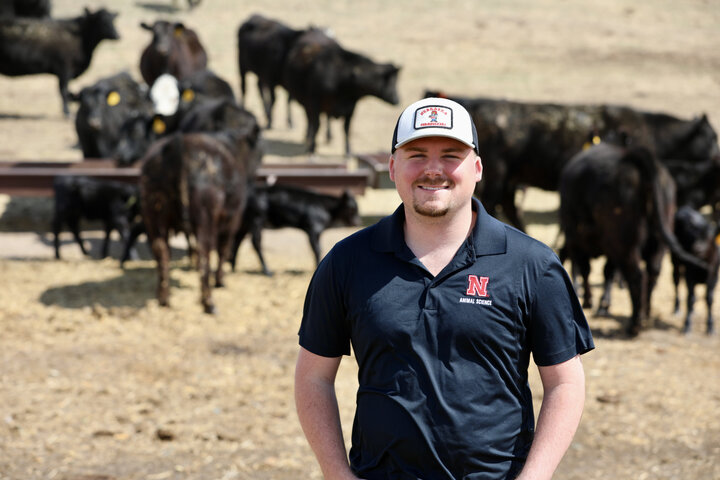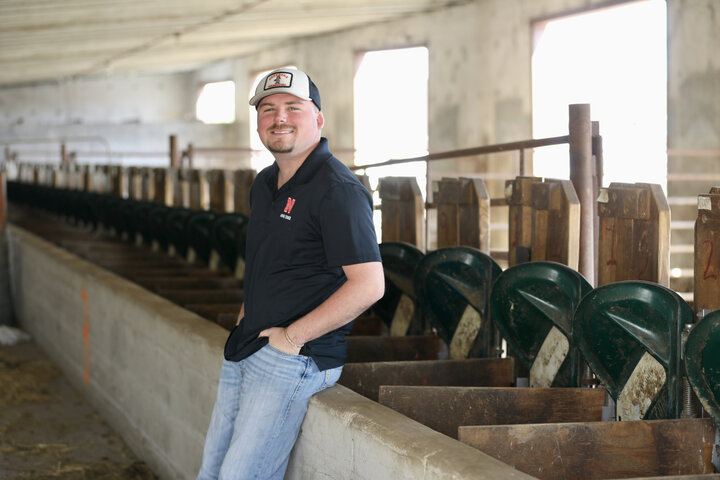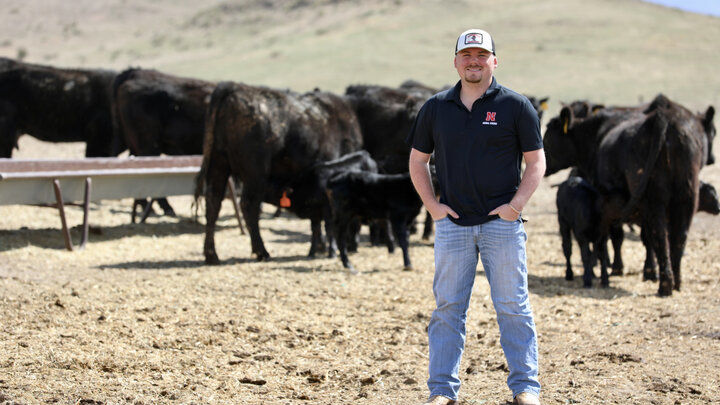Editors note: The largest segment of Nebraska’s agriculture industry is beef production. It powers the state’s economy and has an unmistakable impact on almost everyone in Nebraska. In honor of beef month, the Institute of Agriculture and Natural Resources at the University of Nebraska-Lincoln is sharing a series that will feature people, places and research that are a cornerstone of Nebraska’s land grant mission.
Lincoln, Neb. —Although Landon Tadich wasn’t raised on a farm or ranch, he’s worked alongside the best and brightest in the livestock industry and is wrapping up his master’s in beef reproductive physiology this spring at the University of Nebraska-Lincoln’s West Central Research, Extension and Education Center in North Platte.
A native of rural Perry, Ga., Tadich was first introduced to agriculture in 6th grade and there’s no denying that introduction set the stage for his future. The Perry High School FFA program revealed the many intricacies of agriculture and livestock production to him. From that point on, Tadich was hooked and says he completed nearly every career development experience available to him, whether that be livestock judging, wildlife or poultry.
From there, his FFA experience and love of livestock showing and judging only grew. His constant contact with livestock prompted him to set his eyes on one day becoming a veterinarian, a way of solidifying a future working with livestock.
Tadich dove deeper into the livestock realm after a stint on the livestock judging team at Lake Land College in Mattoon, Ill. As a senior at the University of Georgia, Tadich was involved in undergraduate research in the beef reproductive realm, and ultimately influenced by graduate students in the animal science department working towards various careers in agriculture.

Tadich realized there were multiple opportunities for him within the livestock industry and pursued a graduate degree in Nebraska’s Animal Science Department to capitalize on all that the beef state had to offer.
“Nebraska Extension is well known, especially from a beef cattle standpoint, because Nebraska has a lot of cows, and my goal was to go somewhere where I would have the opportunity to learn from the best, have a hands-on experience, and play a role in applied research that producers appreciate.”
Nebraska has made all the difference for Tadich and allowed him to study heifer development and prenatal programming both at West Central Research, Extension and Education Center in North Platte, as well as the Gudmundsen Sandhills Laboratory north of Whitman.
So far, he’s published one study tackling heifer development, in the 2023 Nebraska Beef Cattle Report, with another to come. Staying true to his mission to set beef producers up for success, Tadich's research tackles one of the greatest economic costs for cow/calf producers — heifer development.
The goal of this study was to investigate production systems that allow for lower inputs and cost for producers without compromising lifelong reproductive success.

“One enticing thing for me about Nebraska is the state is centered around the cattle industry, where people are doing this for their livelihood so they’re always wanting to do the most they can to raise the best cattle,” said Tadich.
Tadich currently serves as the University of Nebraska—Lincoln’s animal science graduate student association vice president. In 2022 he received the Deutscher Fellowship in Beef Cattle Reproductive Physiology from the Agricultural Research Division Advisory Council.
His three semesters prior to working at West Central were spent on Nebraska’s East Campus where he judged and officiated campus contests, served as a TA for Nebraska’s artificial insemination class and several undergraduate classes and labs, as well as gaining experience with extension — checking all of the boxes he had hoped for when deciding that Nebraska was his top choice.
With a network of relationships spanning from the southeastern United States to the Midwest and beyond, Tadich’s knack for building relationships in the agriculture community has been key in finding his place at Nebraska.
“People think of the livestock industry as being an animal driven industry, but people are the ones driving it, Tadich says.
“I have realized the value that different people bring to the table, and those connections are important.”
Tadich is advised by Dr. Rick Funston and co-advised by Dr. Andrea Cupp. He is set to defend his thesis this summer at the Nebraska’s Animal Science Department in Lincoln. Upon graduation, Tadich has plans to work in the livestock industry in a role centered around beef reproductive technologies.
“I want to be in a position where I truly believe in what I’m doing, and in what I’m sharing with others so it’s going to make a difference for somebody.”




